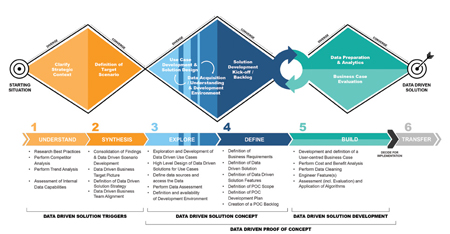THANK YOU FOR SUBSCRIBING
Editor's Pick (1 - 4 of 8)

Eliminating the Disappointment of Artificial Intelligence
Steffen Kuhn, Global Practice Lead Innovation & Special Assets /Head of Digital Engi-neering Center/Managing Partner and Manuela Mackert, Chief Compliance Officers, Deutsche Telekom [ETR: DTE]


Steffen Kuhn, Global Practice Lead Innovation & Special Assets /Head of Digital Engi-neering Center/Managing Partner and Manuela Mackert, Chief Compliance Officers, Deutsche Telekom [ETR: DTE]
Prototypes are the focus here, as they illustrate the usability of the solution approaches to complex problems. With the help of the data-thinking methodology, this process is no longer a black box! By integrating different departments, continuous proof-of-concept, and an exact reflection of data relevance, a very accurate assessment of the ultimate success of a data-oriented digitization strategy can be made.
In addition to the technological and economic aspects, it is also important to take ethical aspects into account. They usually address the unspoken core of customer requirements. Digital ethics is not a mainstream or marketing aspect. Only if customers have confidence in the products and services, they will buy them and recommend them to others.
It is about clarity, transparency, security, responsibility and trust. Deutsche Telekom develops and uses AI to exploit the benefits of this technology (process optimization, abuse detection, improved customer satisfaction, etc.). However, this also holds the challenge of using the AI according to the rules and avoiding, for example, an independent existence of one´s so-called “black boxes” of the AI.
 Against this backdrop, AI guidelines for Deutsche Telekom's AI processes and products were developed more than two years ago - incidentally as one of the first companies in Germany and the world to do so. They are based on Deutsche Telekom's business model and on in-depth discussions with internal and external CI experts, our employees, customers and various representatives of our civil society. We represent the contents of our AI guidelines as a company so that our customers can continue to place their trust in us.
It is therefore of great importance to us that customers and users are enabled to handle new technologies on their own responsibility. Programmers and technicians who deliver and improve these technologies need to do so responsibly and know what to look for
In addition, self-learning systems need defined and initially maintained limits within which they may act. For example, the AI guidelines define who is responsible for which AI system and function.
With the AI guidelines, a valid foundation stone was laid for dealing with AI at DT. But as with a Business Code of Conduct in the analogue world, further steps, regulations, and processes are needed to further formulate the topic and implement it sustainably. For quality assurance the internal processes are used by means of a test matrix with points for the consideration of new AI products. Furthermore, new AI products and services are tested for compliance with the guidelines in our Privacy and Security Assessment (PSA). AI projects are advised directly. An internal seal of approval is awarded for the successful assessment. A first business impact of the initiative can already be seen: For example, cooperation’s with health insurance companies and pharmaceutical companies that pay attention to secure and confidential infrastructure and that have approached us via the topic of “Digital Ethics.” In addition, the sustainable implantation of a “Corporate Digital Responsibility” makes a positive contribution to increasing sustainability ratings.
One project worth highlighting here is the creation of a modular end-to-end product and solution offering (Conversational AI Suite) based on “best-of-breed” partner products in the field of AI. In pilot projects with our business customers, different partners and solutions are implemented and tested. AI also helps our digital assistants to improve recognizing user questions. In return, it learns from past conversations how users formulate certain intentions and can therefore better respond to additional information. The digital assistance complies with the self-binding guidelines of Deutsche Telekom for AI as well. The core here is that customers always know where they stand and whether they are chatting with a machine or a person.
In conclusion, it can be said that only a structured overall view of technology, business environment and ethical aspects, from the early project phase to the rapid testing of the solution, will help many companies to find the right AI solution for their company and to secure customer loyalty.
Check out: Top Artificial Intelligence Companies
Against this backdrop, AI guidelines for Deutsche Telekom's AI processes and products were developed more than two years ago - incidentally as one of the first companies in Germany and the world to do so. They are based on Deutsche Telekom's business model and on in-depth discussions with internal and external CI experts, our employees, customers and various representatives of our civil society. We represent the contents of our AI guidelines as a company so that our customers can continue to place their trust in us.
It is therefore of great importance to us that customers and users are enabled to handle new technologies on their own responsibility. Programmers and technicians who deliver and improve these technologies need to do so responsibly and know what to look for
In addition, self-learning systems need defined and initially maintained limits within which they may act. For example, the AI guidelines define who is responsible for which AI system and function.
With the AI guidelines, a valid foundation stone was laid for dealing with AI at DT. But as with a Business Code of Conduct in the analogue world, further steps, regulations, and processes are needed to further formulate the topic and implement it sustainably. For quality assurance the internal processes are used by means of a test matrix with points for the consideration of new AI products. Furthermore, new AI products and services are tested for compliance with the guidelines in our Privacy and Security Assessment (PSA). AI projects are advised directly. An internal seal of approval is awarded for the successful assessment. A first business impact of the initiative can already be seen: For example, cooperation’s with health insurance companies and pharmaceutical companies that pay attention to secure and confidential infrastructure and that have approached us via the topic of “Digital Ethics.” In addition, the sustainable implantation of a “Corporate Digital Responsibility” makes a positive contribution to increasing sustainability ratings.
One project worth highlighting here is the creation of a modular end-to-end product and solution offering (Conversational AI Suite) based on “best-of-breed” partner products in the field of AI. In pilot projects with our business customers, different partners and solutions are implemented and tested. AI also helps our digital assistants to improve recognizing user questions. In return, it learns from past conversations how users formulate certain intentions and can therefore better respond to additional information. The digital assistance complies with the self-binding guidelines of Deutsche Telekom for AI as well. The core here is that customers always know where they stand and whether they are chatting with a machine or a person.
In conclusion, it can be said that only a structured overall view of technology, business environment and ethical aspects, from the early project phase to the rapid testing of the solution, will help many companies to find the right AI solution for their company and to secure customer loyalty.
Check out: Top Artificial Intelligence Companies
 Against this backdrop, AI guidelines for Deutsche Telekom's AI processes and products were developed more than two years ago - incidentally as one of the first companies in Germany and the world to do so. They are based on Deutsche Telekom's business model and on in-depth discussions with internal and external CI experts, our employees, customers and various representatives of our civil society. We represent the contents of our AI guidelines as a company so that our customers can continue to place their trust in us.
It is therefore of great importance to us that customers and users are enabled to handle new technologies on their own responsibility. Programmers and technicians who deliver and improve these technologies need to do so responsibly and know what to look for
In addition, self-learning systems need defined and initially maintained limits within which they may act. For example, the AI guidelines define who is responsible for which AI system and function.
With the AI guidelines, a valid foundation stone was laid for dealing with AI at DT. But as with a Business Code of Conduct in the analogue world, further steps, regulations, and processes are needed to further formulate the topic and implement it sustainably. For quality assurance the internal processes are used by means of a test matrix with points for the consideration of new AI products. Furthermore, new AI products and services are tested for compliance with the guidelines in our Privacy and Security Assessment (PSA). AI projects are advised directly. An internal seal of approval is awarded for the successful assessment. A first business impact of the initiative can already be seen: For example, cooperation’s with health insurance companies and pharmaceutical companies that pay attention to secure and confidential infrastructure and that have approached us via the topic of “Digital Ethics.” In addition, the sustainable implantation of a “Corporate Digital Responsibility” makes a positive contribution to increasing sustainability ratings.
One project worth highlighting here is the creation of a modular end-to-end product and solution offering (Conversational AI Suite) based on “best-of-breed” partner products in the field of AI. In pilot projects with our business customers, different partners and solutions are implemented and tested. AI also helps our digital assistants to improve recognizing user questions. In return, it learns from past conversations how users formulate certain intentions and can therefore better respond to additional information. The digital assistance complies with the self-binding guidelines of Deutsche Telekom for AI as well. The core here is that customers always know where they stand and whether they are chatting with a machine or a person.
In conclusion, it can be said that only a structured overall view of technology, business environment and ethical aspects, from the early project phase to the rapid testing of the solution, will help many companies to find the right AI solution for their company and to secure customer loyalty.
Check out: Top Artificial Intelligence Companies
Against this backdrop, AI guidelines for Deutsche Telekom's AI processes and products were developed more than two years ago - incidentally as one of the first companies in Germany and the world to do so. They are based on Deutsche Telekom's business model and on in-depth discussions with internal and external CI experts, our employees, customers and various representatives of our civil society. We represent the contents of our AI guidelines as a company so that our customers can continue to place their trust in us.
It is therefore of great importance to us that customers and users are enabled to handle new technologies on their own responsibility. Programmers and technicians who deliver and improve these technologies need to do so responsibly and know what to look for
In addition, self-learning systems need defined and initially maintained limits within which they may act. For example, the AI guidelines define who is responsible for which AI system and function.
With the AI guidelines, a valid foundation stone was laid for dealing with AI at DT. But as with a Business Code of Conduct in the analogue world, further steps, regulations, and processes are needed to further formulate the topic and implement it sustainably. For quality assurance the internal processes are used by means of a test matrix with points for the consideration of new AI products. Furthermore, new AI products and services are tested for compliance with the guidelines in our Privacy and Security Assessment (PSA). AI projects are advised directly. An internal seal of approval is awarded for the successful assessment. A first business impact of the initiative can already be seen: For example, cooperation’s with health insurance companies and pharmaceutical companies that pay attention to secure and confidential infrastructure and that have approached us via the topic of “Digital Ethics.” In addition, the sustainable implantation of a “Corporate Digital Responsibility” makes a positive contribution to increasing sustainability ratings.
One project worth highlighting here is the creation of a modular end-to-end product and solution offering (Conversational AI Suite) based on “best-of-breed” partner products in the field of AI. In pilot projects with our business customers, different partners and solutions are implemented and tested. AI also helps our digital assistants to improve recognizing user questions. In return, it learns from past conversations how users formulate certain intentions and can therefore better respond to additional information. The digital assistance complies with the self-binding guidelines of Deutsche Telekom for AI as well. The core here is that customers always know where they stand and whether they are chatting with a machine or a person.
In conclusion, it can be said that only a structured overall view of technology, business environment and ethical aspects, from the early project phase to the rapid testing of the solution, will help many companies to find the right AI solution for their company and to secure customer loyalty.
Check out: Top Artificial Intelligence Companies











